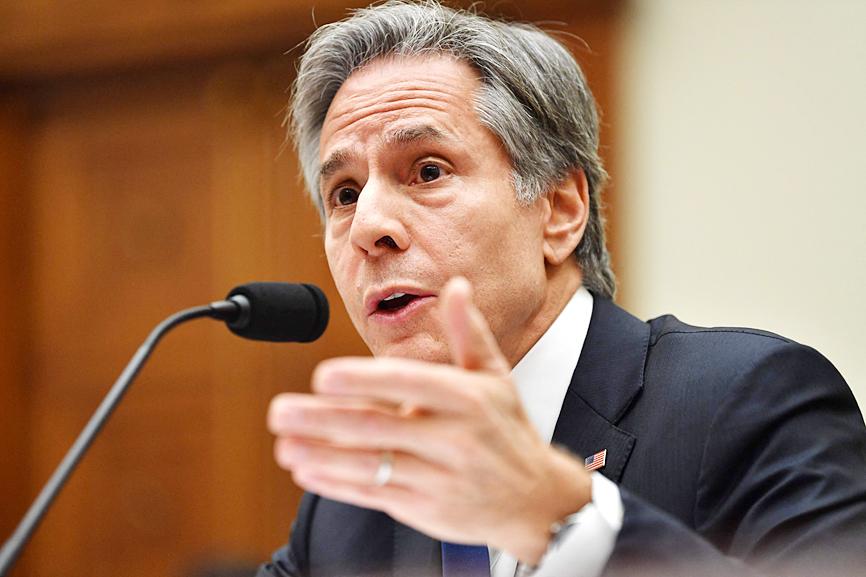The US is to “engage virtually every country” in the region in creating the Indo-Pacific Economic Framework (IPEF), US Secretary of State Antony Blinken said on Thursday, as he dismissed concerns that Washington had shut the door on Taiwan.
At a hearing of the US House of Representatives Committee on Foreign Affairs, US Representative Ann Wagner asked Blinken whether Taiwan was being excluded from joining the IPEF, an initiative proposed by US President Joe Biden last year with the aim of enhancing its economic engagement in the Indo-Pacific region.
“I am particularly concerned that Taiwan is being shut out of the Indo-Pacific Economic Framework, even though the administration may try to kind of hide this by never formally closing the doors, so to speak, to participation; Taiwan’s offer to become a full member is not being accepted,” Wagner said.

Photo: AFP
Wagner said the policy to deny Taiwan’s participation in the IPEF is “self-defeating and dangerous” given that it was the US’ eighth-largest trading partner last year and one of its largest trading partners in Asia.
Blinken said “there is no such policy” to exclude Taiwan.
“There is nothing that is closing the door on anyone, including Taiwan,” he added.
The US has just started the process of launching the IPEF, including beginning conversations with a number of countries as potential partners, Blinken said.
“It’s going to be open, it’s going to be inclusive and I imagine we’re going to be engaging virtually every country in the region,” he added.
Wagner said that Taiwan had made it clear to the US in recent bilateral talks that becoming a full member of the IPEF is its “No. 1 and top request,” and Taipei has changed national laws in anticipation of starting free-trade negotiations.
She urged Blinken to send more reaffirming messages to Taiwan.
“As a rule of law, democracy and a top global trading partner, Taiwan should certainly be a top priority for the framework,” Wagner said. “But instead, this administration is marginalizing Taiwan and showing the Chinese Communist Party that the United States is deterred from working with a critical partner.”
Similar concerns have been raised by other US lawmakers.
A bipartisan group of 200 US representatives on March 30 published a letter addressed to US Secretary of Commerce Gina Raimondo and US Trade Representative Katherine Tai (戴琪) to petition for Taiwan’s inclusion in the IPEF.
Reuters cited unnamed sources in a March 31 story as saying that Raimondo told a closed-door meeting of the US Senate Finance Committee the week before that the administration was not considering Taiwan’s inclusion at this time.

ENDEAVOR MANTA: The ship is programmed to automatically return to its designated home port and would self-destruct if seized by another party The Endeavor Manta, Taiwan’s first military-specification uncrewed surface vehicle (USV) tailor-made to operate in the Taiwan Strait in a bid to bolster the nation’s asymmetric combat capabilities made its first appearance at Kaohsiung’s Singda Harbor yesterday. Taking inspiration from Ukraine’s navy, which is using USVs to force Russia’s Black Sea fleet to take shelter within its own ports, CSBC Taiwan (台灣國際造船) established a research and development unit on USVs last year, CSBC chairman Huang Cheng-hung (黃正弘) said. With the exception of the satellite guidance system and the outboard motors — which were purchased from foreign companies that were not affiliated with Chinese-funded

PERMIT REVOKED: The influencer at a news conference said the National Immigration Agency was infringing on human rights and persecuting Chinese spouses Chinese influencer “Yaya in Taiwan” (亞亞在台灣) yesterday evening voluntarily left Taiwan, despite saying yesterday morning that she had “no intention” of leaving after her residence permit was revoked over her comments on Taiwan being “unified” with China by military force. The Ministry of the Interior yesterday had said that it could forcibly deport the influencer at midnight, but was considering taking a more flexible approach and beginning procedures this morning. The influencer, whose given name is Liu Zhenya (劉振亞), departed on a 8:45pm flight from Taipei International Airport (Songshan airport) to Fuzhou, China. Liu held a news conference at the airport at 7pm,

Taiwan was ranked the fourth-safest country in the world with a score of 82.9, trailing only Andorra, the United Arab Emirates and Qatar in Numbeo’s Safety Index by Country report. Taiwan’s score improved by 0.1 points compared with last year’s mid-year report, which had Taiwan fourth with a score of 82.8. However, both scores were lower than in last year’s first review, when Taiwan scored 83.3, and are a long way from when Taiwan was named the second-safest country in the world in 2021, scoring 84.8. Taiwan ranked higher than Singapore in ninth with a score of 77.4 and Japan in 10th with

GRIDLOCK: The National Fire Agency’s Special Search and Rescue team is on standby to travel to the countries to help out with the rescue effort A powerful earthquake rocked Myanmar and neighboring Thailand yesterday, killing at least three people in Bangkok and burying dozens when a high-rise building under construction collapsed. Footage shared on social media from Myanmar’s second-largest city showed widespread destruction, raising fears that many were trapped under the rubble or killed. The magnitude 7.7 earthquake, with an epicenter near Mandalay in Myanmar, struck at midday and was followed by a strong magnitude 6.4 aftershock. The extent of death, injury and destruction — especially in Myanmar, which is embroiled in a civil war and where information is tightly controlled at the best of times —